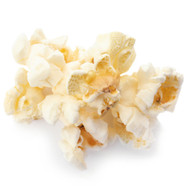Why Don't All of my Popcorn Kernels Pop?
May 17th 2019
If you’ve ever enjoyed a heaping bowl of popcorn while watching your favorite movie, you may have noticed that when you reach the bottom of your bowl, there are a handful of un-popped kernels that remain.
These lonely kernels are called“Old Maids,” and sometimes“spinsters.” It’s probably not something you typically think twice about and simply toss in the garbage. But have you ever wondered — why don’t some of these kernels pop?
The answer is actually quite simple: water.
The“popability” of popcorn kernels depends on the kernel’s water content. When a kernel heats up, the water inside of it releases steam, which puts pressure on the kernel’s shell — until it explodes. Technically speaking, popcorn kernels need to have a specific moisture level in their starchy center(approximately 15%) in order to explode. But scientists found that along with a kernel’s water content, the popcorn hull actually has a lot to do with whether or not a kernel will pop.
The hull is the crunchy outside layer of a popcorn kernel. When the hull is heated, it changes structure and becomes tight, which creates a seal that the water inside the kernel is unable to pass through. Around 212 degrees, the water trapped inside a kernel turns into steam, and it continues to heat to about 347 degrees. When the pressure of the water rises, it presses against the tightened hull, and will eventually pop. If a hull structure is imperfect, water is able to escape through leaks and the kernel will remain un-popped.
Researchers have found that the percentage of Old Maids is greater in cheaper popcorn brands, while premium brands have a far lower percentage of unpopped kernels. If you want more bang — or pop! — for your buck, it’s worthwhile to purchase popcorn that has been carefully grown for quality and taste, like we do at Amish Country Popcorn.

